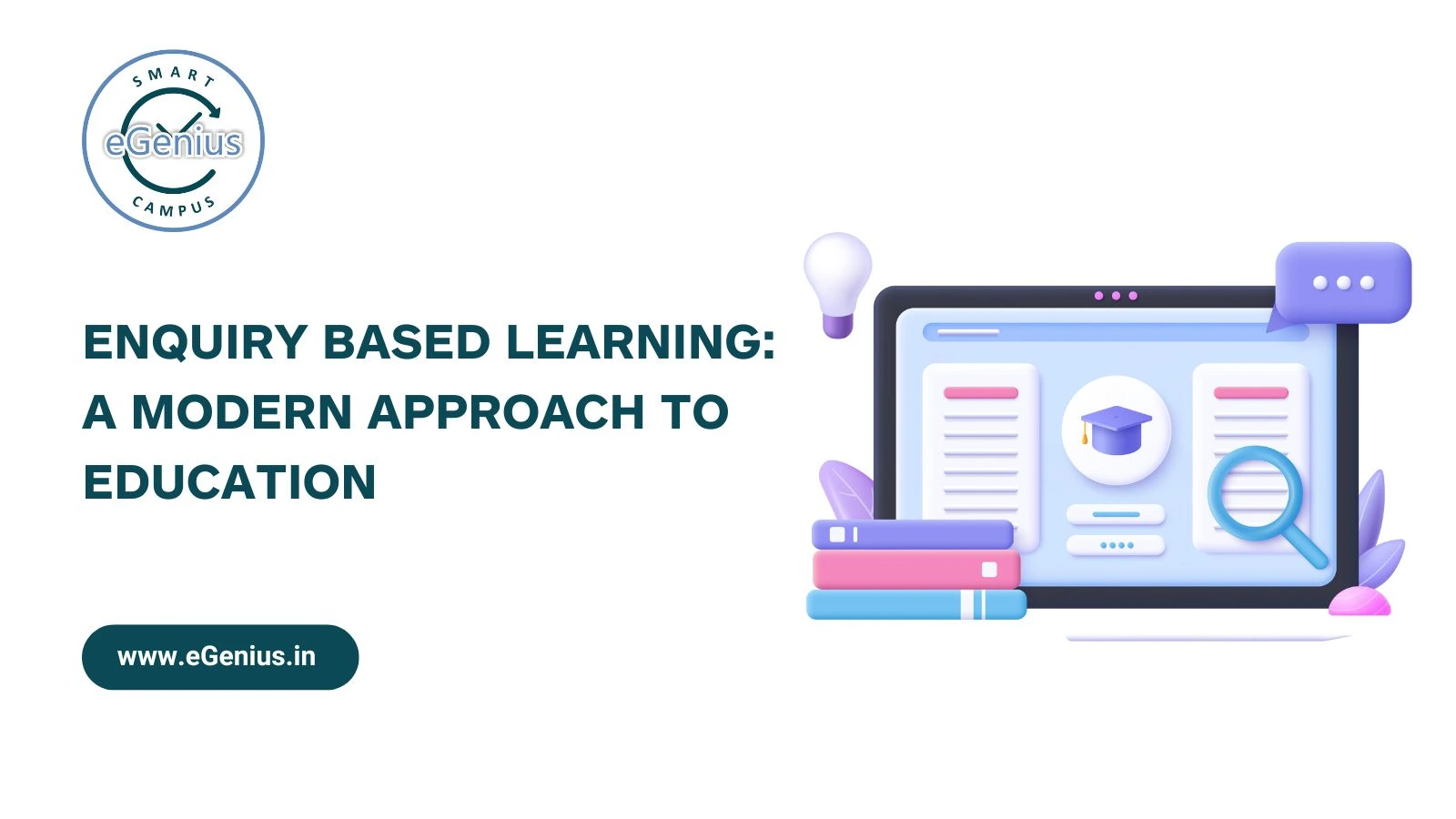Enquiry Based Learning is changing the way students experience education by putting curiosity and exploration at the heart of the learning process. Instead of memorizing facts, students actively seek answers and solve problems. This approach makes lessons more exciting and helps develop essential skills for the future. In this blog, we’ll explore how Enquiry Based Activities works, its benefits, and how eGenius Education ERP Software can support its implementation in schools.
What is Enquiry Based Learning?
Enquiry Based Learning encourages learners to lead through questioning, exploring, and digging into subjects. Instead of answers coming straight from teachers, students take the charge to uncover knowledge. Starting with a question, the process calls students to dig deeper, engage in talks and do tangible activities. This way of learning catches their interest, as they’re active participants in solving problems.
How Does Enquiry Based Learning Work?
Imagine starting a lesson with a real puzzler. Something like, “Why do you think plants thrive in the sun?” skipping over the textbook definition of photosynthesis. This is Inquiry Based Learning. The students dig into the subject. They might perform some experiments, browse the web for answers or chat with their peers about it. The goal? It’s about nurturing independence in learning and promoting teamwork and sharp thinking.
Here’s a typical Enquiry Based Learning cycle:
1. Start with a Question: The journey starts when a student or teacher raises a question about a topic.
2. Research and Exploration: Students investigate the question through various resources like books, online articles, and experiments.
3. Share Findings: After gathering information, students present their findings to the class.
4. Reflect and Revise: Finally, students reflect on their discoveries, deepening their understanding.
Key Benefits of Enquiry Based Learning
1. Promotes Critical Thinking: It encourages students to analyze and solve problems on their own.
2. Increases Engagement: When students take charge of their learning, they become more interested in the subjects.
3. Encourages Collaboration: Working together on projects or discussing ideas improves teamwork.
4. Boosts Retention: Students retain information better when they discover it themselves.
5. Prepares for Real-World Challenges: It helps students develop essential life skills such as problem-solving, adaptability, and independent thinking.
Examples of Enquiry Based Learning in Classrooms
1. Science Experiments: Instead of teaching about magnetism directly, teachers can ask, “How can we make objects stick together without glue?” Students can then experiment with magnets.
2. History Research: Instead of giving a lecture on ancient civilizations, teachers could prompt students to explore questions like, “What would life be like today if ancient Egypt had never existed?”
3. Math Challenges: Teachers can encourage students to solve puzzles that have multiple solutions, rather than following a fixed approach.
Implementing Enquiry Based Learning in Schools
For schools to implement Enquiry Based Actively effectively, some steps should be followed:
1. Provide Teacher Training: Educators need guidance on how to encourage students to ask questions and explore topics.
2. Create a Supportive Environment: Classrooms should allow for discussions, research, and hands-on projects.
3. Offer Necessary Resources: Students should have access to books, the internet, and other tools that support learning.
4. Start Gradually: Schools can introduce Enquiry Based activities with small projects before expanding.
How eGenius Education ERP Supports Enquiry Based Learning
Enquiry Based Learning can be more effectively implemented with the help of eGenius Education ERP. Our software provides several features that simplify the process for both teachers and students:
1. Collaborative Tools: The platform facilitates group projects and discussions with built-in communication features, helping students work together even outside the classroom.
2. Assessment Tracking: Teachers can track students’ progress through various enquiry-based activities, making it easier to provide feedback and tailor instruction.
3. Customizable Learning Paths: eGenius Education ERP allows teachers to create individual learning plans based on students’ interests and needs, which aligns perfectly with Enquiry Based Learnings.
4. Data-Driven Insights: The software provides analytics on student performance, helping educators understand which enquiry-based methods are most effective.
By integrating Enquiry Based Learning with eGenius Education ERP, schools can create a dynamic learning environment that nurtures curiosity, critical thinking, and real-world problem-solving skills.
With eGenius Education ERP backing up Enquiry Based Learning, both teachers and students get to experience a refreshing and forward-thinking style of education. It’s not the typical class where students just listen and remember. It encourages an eagerness to learn and an adventure spirit, changing what school looks like. It’s a place where students take an active part, learning isn’t about just memorizing, it’s about gaining insight into the world.
FAQs
1. What is the main goal of Enquiry Based Learning?
The main goal of Enquiry Based Learning is to make students active participants in their education by encouraging them to ask questions, explore, and discover knowledge on their own. This approach enhances critical thinking and problem-solving skills.
2. How is Enquiry Based Learning different from traditional teaching methods?
Traditional teaching focuses on delivering information from teachers to students, whereas Enquiry Based Learning involves students taking the lead in finding answers and understanding concepts through exploration.
3. How can eGenius Education ERP help with Enquiry Based Learning?
eGenius Education ERP supports Enquiry Based Learning by providing digital resources, collaborative tools, customizable learning plans, and analytics to track student progress. These features help teachers facilitate enquiry-based activities effectively.
4. What are some simple Enquiry Based Learning activities for young students?
Simple activities include science experiments like testing which objects float in water, history projects investigating family traditions, and math challenges that involve finding different ways to solve a problem.
5. Why is Enquiry Based Learning important for modern education?
Enquiry Based Learnings are important because it prepares students for the future by developing skills such as critical thinking, problem-solving, and adaptability. It makes learning more enjoyable and meaningful by connecting it to real-life situations.
Bring Enquiry Based Learning to life in your classrooms. Contact us to see how eGenius Education ERP can make it happen!















